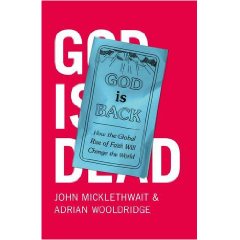 God thrives in the midst of healthy competition. Arguments and stances against God can turn out to be some of the best adverts for him. In the UK, you only have to look at the media coverage generated by arguments by people like Dawkins and the London Buses campaign against God’s existence to see people who might never otherwise have stopped to think about it pause to consider what they really believe. Meanwhile, in countries like as China, where Christianity is outlawed, despite persecution of Jesus’ followers there’s evidence of some of the most remarkable church growth seen anywhere.
God thrives in the midst of healthy competition. Arguments and stances against God can turn out to be some of the best adverts for him. In the UK, you only have to look at the media coverage generated by arguments by people like Dawkins and the London Buses campaign against God’s existence to see people who might never otherwise have stopped to think about it pause to consider what they really believe. Meanwhile, in countries like as China, where Christianity is outlawed, despite persecution of Jesus’ followers there’s evidence of some of the most remarkable church growth seen anywhere.
In an article published in The Scotsman today John Micklethwait says that when the Economist, of which he’s the Editor, published God’s Obituary in its Millenium issue, its prediction of faith’s demise was misguided. Now, he says, the message is that God is Back. He’s written a book explaining why.
Not only is God back, but he suggests that the more modern our society gets (and Economist-style, he harks back to arguments between David Hume and Adam Smith to substantiate his position), the more evident it becomes that as humans we are fundamentally theocentric. Rather than killing religion, democracy and markets, technology and reason are combining to make it stronger. The crux of the argument is this: modernity provides choice; choice gives rise not to increasing secularism but to pluralism; and where there’s pluralism we’re forced to make decisions. That goes for making decisions about our belief in God as much as anything else. There’s no such thing as not making a decision about it – arguably, a failure to decide for God implicity results in a decision against him.
The good news for God, argues Micklethwait, is that we want to believe in him. Given a chance to believe, we’ll do so. The election of President Obama, he suggests, will be a great sales appointment for God:
“Imagine you are a young accountant in Edinburgh or a young financier in Glasgow; the picture of Obama as a young, liberally minded metrosexual walking into a church in Chicago and finding some kind of meaning in his life is … powerful…
[Religion] is something that’s going to be around and is spreading and will affect politics and public life.”
I hope so.
 Fast-paced, terrifying… this graphic re-imagination of the gospel of Mark in a contemporary fictional setting is clever and deep. The people are blinded and demon-possessed. Jesus can change them, but they don’t, for the most part, have the eyes to see.
Fast-paced, terrifying… this graphic re-imagination of the gospel of Mark in a contemporary fictional setting is clever and deep. The people are blinded and demon-possessed. Jesus can change them, but they don’t, for the most part, have the eyes to see.
 God thrives in the midst of healthy competition. Arguments and stances against God can turn out to be some of the best adverts for him. In the UK, you only have to look at the media coverage generated by arguments by people like Dawkins and the London Buses campaign against God’s existence to see people who might never otherwise have stopped to think about it pause to consider what they really believe. Meanwhile, in countries like as China, where Christianity is outlawed, despite persecution of Jesus’ followers there’s evidence of some of the most remarkable church growth seen anywhere.
God thrives in the midst of healthy competition. Arguments and stances against God can turn out to be some of the best adverts for him. In the UK, you only have to look at the media coverage generated by arguments by people like Dawkins and the London Buses campaign against God’s existence to see people who might never otherwise have stopped to think about it pause to consider what they really believe. Meanwhile, in countries like as China, where Christianity is outlawed, despite persecution of Jesus’ followers there’s evidence of some of the most remarkable church growth seen anywhere.